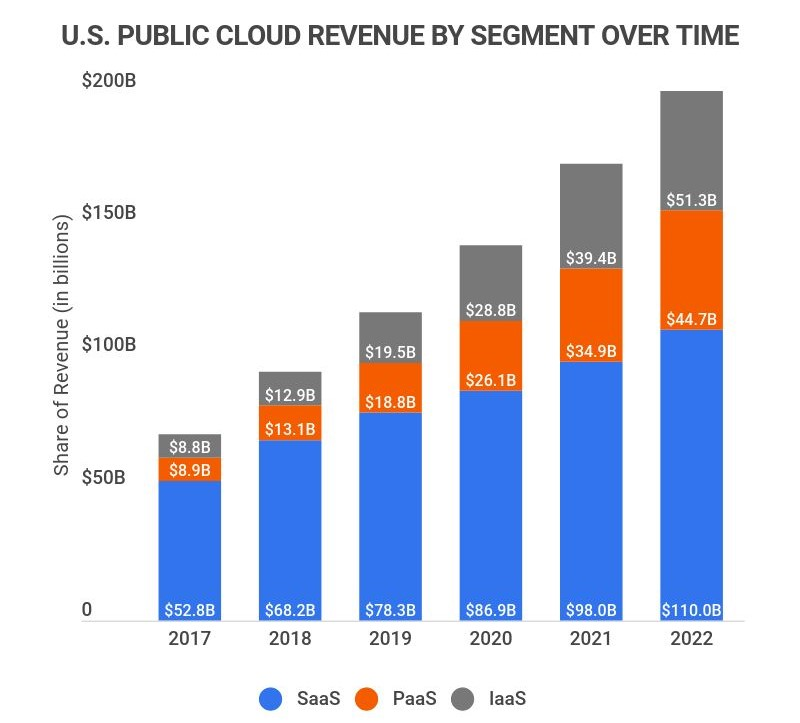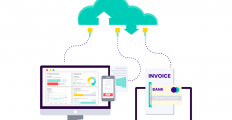As of 2019, the US became the most significant public cloud market, with an expected spending of $124.6 billion.
In Australia, 42% of businesses are using paid cloud computing to run their businesses, while in Europe, 38% of businesses are now using cloud-based financial services.
Cloud computing is becoming one of the most vivid trends in accounting digitizing of 2023. But what exactly is cloud computing, and why is it important to businesses today? For most folks, the term “cloud” may feel overused and a little outdated at this point. In reality, though, the cloud has never been more important than it is today for businesses, particularly in the case of accounting. To put it simply, cloud computing is the delivery of computing services over the Internet. This could be storage, data analysis, or, in the case of this article: accounting services.
Cloud accounting can change how you approach bookkeeping, financial analysis, and expense management by providing you with real-time information on your key financial numbers. But with so many platforms out there, how do you know which one’s the right choice for you? In this article, we’ll take you through everything you need to know about cloud accounting.

What is cloud accounting?
Cloud accounting involves using online accounting software hosted on safe remote servers. Businesses can store and access financial information, reports, and other sensitive documents from anywhere as long as you can a working laptop and internet connection.
Additionally, cloud accounting allows safe remote storage for multi-user access. All your users can work simultaneously, and the data is safely processed, stored, and returned as and when required. The cloud enables businesses to streamline their processes and set themselves up for scale.
How Does Cloud Accounting Differ From Traditional Accounting Software?
Traditional accounting
Before the cloud, all accounting tools were desktop-based, meaning the application itself was installed and ran from the hard disk of your office computer. This brought about a number of issues, like limited access to data, the need for constant software updates, and the added charges for backing up organization-wide financial information.
Cloud accounting
Cloud or online accounting software has all the functionalities of a desktop-based tool but with one major difference: it moves the entire accounting process to the cloud and helps you expand on it. You no longer need to log in to a desktop application but have access to a real-time view of data that’s safely stored on the cloud server. Most cloud tools also have an open API, allowing you to integrate with other third-party applications, which can add further value to your accounting process.
8 Reasons Businesses Should Shift to Cloud Accounting
Moving accounting processes from desktop to the cloud has proved to be a huge leap forward in business financial management, as most of the issues posed by traditional accounting and their associated costs were removed from the picture. But what are the specific ways in which cloud accounting enables your business?
Here are eight of them.
1. Reduced operational costs
Traditional accounting was an expensive affair as finance tech companies often demanded a steep licensing fee which needed to be renewed on a contractual basis. And the softwares often being hard to use, and businesses had to hire tech specialists just to train their accountants in using the software, which was also an added cost.
Cloud accounting on the other hand, involves users accessing the tool via the internet. This meant businesses could also sign-up for free trials and could choose to pay a monthly or yearly fee to unlock additional features. And with the surplus numbers of softwares available today, this fee is also nominal
Additionally, since the software stores user data on its dedicated servers, it eliminates the need for businesses to invest in highly capable computers to support these accounting tools. Shifting to a cloud-based accounting mode can help businesses decrease operational costs.
2. Helps to save time
Accounting is traditionally seen as a dull and tedious profession owing to the fact that most tasks are repetitive and time-consuming. However, cloud tools are slowly changing this perception by automating mundane tasks like invoicing, payroll, expense management, or budgeting, thereby freeing up your accountant’s time.
The software is capable of recording recurring transactions like rent, utility payments, and other work-related subscriptions, so accountants don’t need to worry about manually sending out payments each time.
3. Secure storage for all your information
Malware and viruses can damage your data and devices and, ultimately, your credibility as a business. Cloud accounting can ensure computer malware does not affect the sensitive accounting data stored in your device.
By storing your data in their secure servers, cloud tools ensure that businesses don’t have to worry about malware attacks or losing out sensitive data.
4. Enables faster collaboration
A cloud accounting tool makes it easier for your accountants to collaborate and work together with every other department. The tool makes it easier to generate reports for which your accountant would normally have been dependent on you. Accountants can now access the information they need from virtually anywhere.
5. Helps you make data-driven decisions
Cloud accounts tools help you use your data better by offering insights into various aspects of your financial information. This enables you to make data-driven decisions and thereby helps enhance the efficiency of your business operations.
6. Declutter your workplace by going paperless
With traditional accounting, handling your finances means a lot of added paperwork, making it quite challenging.
Filing through your receipts, invoices, and expenses can be tedious. A cloud accounting system, on the other hand, lets you immediately import the data from your paperwork right into the system. Having this data in the software will give you a real-time view of your organization’s finances without going through stacks of papers. This also helps you reduce the risk of manual errors or losing out on information, thereby giving you a much more efficient method to manage your finances.
7. Enhanced access control and privacy settings
Cloud accounting tools give you access to numerous privacy settings where you can decide how much data each employee can access. You have different levels of access, going from need-to-know to all-access.
This means if you have an employee who’s working in payroll, you can give them access to just payroll information without giving them access to employee bank accounts and other financial information.
8. Constant tech support
Finally, one of the most important benefits of cloud accounting is access to tech support.
You can contact customer support via telephone or chatboxes within the tool, which will connect you to professionals who can help you with any issues you have. This helps your organization save money as you no longer have to employ an in-house IT rep to deal with all software related issues.
Top features to look for in a cloud-accounting software
Make sure you go through all the different software available in the market before you make your final pick. This ensures that you can narrow down on those specific tools which perfectly suit your organization’s needs.
To help you out, here’s a handy checklist of features to look for in an accounting tool:
- Intuitive and easy-to-use UI
- Secure and dedicated storage
- Integrations with other software
- A dedicated mobile application
- Multi-user access
Apart from these, ensure the software can also optimize core accounting modules like:
- Payroll
- Invoicing
- Financial reporting
- Cash flow management
- Inventory tracking
- Expense-tracking
Finally, remember that the accounting tool you choose needs to have the ability to scale. This becomes important as your business expands and undergoes changes. Here, your accounting software would need to accommodate more clients, send out many more invoices, or even handle multiple projects with separate billing modules.
Now that you’re familiar with the benefits of cloud accounting and what to look for in an accounting tool, you can take a look at our list of the best online accounting software and take your pick!
In Conclusion
Cloud accounting is changing the industry by pushing those who’re looking to make a career out of accounting to embrace this change. Businesses can utilize cloud tools to focus on their internal operations and boost performance. Considering these benefits, businesses should consider leaving behind traditional accounting processes and technologies.
The world is changing; it’s time you did too.
























Leave a comment!